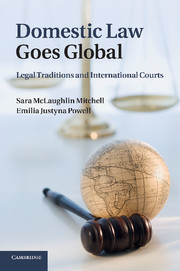Book contents
- Frontmatter
- Contents
- List of figures
- List of tables
- List of boxes
- Acknowledgments
- List of acronyms
- 1 The creation and expansion of international courts
- 2 Major legal traditions of the world
- 3 A rational legal design theory of international adjudication
- 4 Domestic legal traditions and the creation of the International Criminal Court
- 5 Domestic legal traditions and state support for the World Court
- 6 The rational design of state commitments to international courts
- 7 The consequences of support for international courts
- 8 Conclusion
- References
- Index
2 - Major legal traditions of the world
Published online by Cambridge University Press: 21 April 2011
- Frontmatter
- Contents
- List of figures
- List of tables
- List of boxes
- Acknowledgments
- List of acronyms
- 1 The creation and expansion of international courts
- 2 Major legal traditions of the world
- 3 A rational legal design theory of international adjudication
- 4 Domestic legal traditions and the creation of the International Criminal Court
- 5 Domestic legal traditions and state support for the World Court
- 6 The rational design of state commitments to international courts
- 7 The consequences of support for international courts
- 8 Conclusion
- References
- Index
Summary
In this chapter, we lay the groundwork for our theoretical argument about the creation of new international courts and the expansion of state support for pre-existing courts by focusing on the characteristics of the three major domestic legal traditions in the world: civil law, common law, and Islamic law. We provide a brief historical account of the origins of these three legal families and we describe the major distinctions between them, including differences in the source of law, distinctions in the law of contracts, and variations in legal procedures (e.g. litigation). We then discuss how these features of domestic legal traditions influence foreign policy decision-making processes, especially as they impinge upon the creation of new international institutions and the signature and design of interstate commitments. We conclude by describing some of the convergences that have occurred over time between these legal families, especially between civil law and common law, and the significance of this temporal trend for our research.
Introduction to legal systems
Each state in the international system, as a political entity, possesses its own legal system, which is manifested at any point in history by a system of rules, norms, and principles. There are several definitions of the term “legal system.” Merryman (1985, 1) defines it as “an operating set of legal institutions, procedures, and rules.”
- Type
- Chapter
- Information
- Domestic Law Goes GlobalLegal Traditions and International Courts, pp. 20 - 67Publisher: Cambridge University PressPrint publication year: 2011



